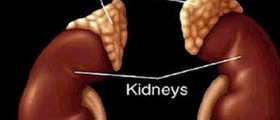
Cushing's syndrome
Cushing's syndrome is a disorder which is a result of overproduction of the hormone cortisol. It is a rare disease which affects young adults and middle aged people. Excessive amount of cortisol can be a consequence of a hormone treatment, impaired function of the adrenal gland or tumor. Cortisol is the hormone which helps body to deal with stress, keeps the blood pressure normal and regulates metabolism of fats, proteins and carbohydrates.Symptoms
The symptoms of Cushing's syndrome can vary from one person to another, depending on the severity of the condition. Some of the most common symptoms may include severe tiredness, weakness in the muscles, extreme thirst, frequent urge to urinate, headache, irregular menstrual period, decreased sexual ability in men, bone weakness which can lead to frequent fractures, rounding of the face, mood changes such as depression, anxiety or aggravation, and high blood pressure and glucose. Another symptom of Cushing's syndrome is weight gain in the upper part of the body. Your face and neck appear to be fat, but the arms and the rest of the body remains slim. Your skin can be affected by Cushing's syndrome as well. The symptoms which involve skin disorders are purple stretch marks which can be visible on the tights, abdomen, breasts and arms, thinning of the skin, bruising, poor healing, acne and body hair.Treatment
Cushing's syndrome is sometimes difficult to diagnose if the symptoms are mild. There are various treatment options for Cushing's syndrome, but all of them aim at reducing the level of the hormone cortisol. If Cushing's syndrome was caused by cortisol in medications used in some other treatment, your doctor will decrease the amount of medications or change your treatment. If Cushing's syndrome is a consequence of a tumor in the pituitary or adrenal glands, the best treatment option is a surgery which will remove the tumor. In addition to surgery or instead of surgery you may need a radiation therapy or chemotherapy. Another treatment option is medications therapy. There are certain medications which are designed to control the production of cortisol in the body. Adequate treatment is very important in dealing with Cushing's syndrome because the managing the symptoms and causes can be time consuming.Complications
If left untreated, Cushing's syndrome may have serious and permanent consequences. Since Cushing's syndrome affects bones, you may develop osteoporosis. It is a condition when the density of your bones is reduced which makes the bones easy to break. Other complications include kidney stones, diabetes, various infections, high blood pressure and constant fatigue.
















Your thoughts on this
Loading...